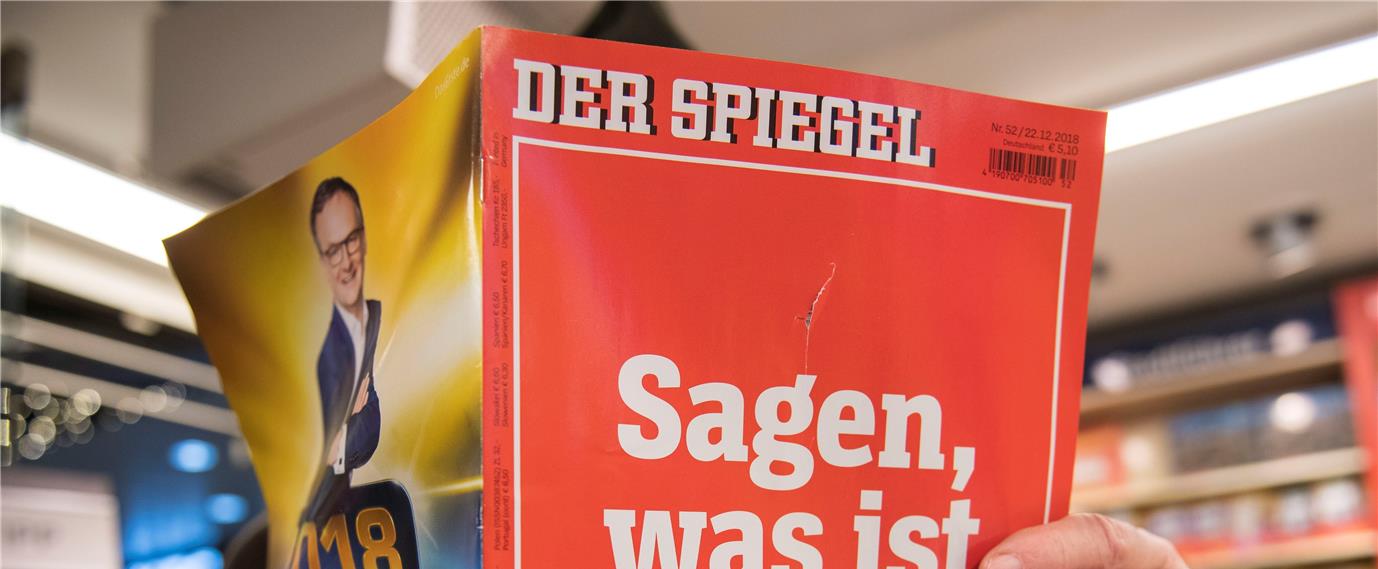مشهدٌ أوّل: تخييلٌ حقيقيّ
جيري دانتانا Jerry Dantana، شخصيّة تخيليّة من المسلسل الأميركي The Newsroom، صحفيّ ومنتج أوّل في قناة إخبارية، تلاعب بشريط صوّره مع أحد المصادر، ليؤكد فرضية تحقيق صحفيّ كان يجريه حول استخدام الجيش الأميركي لغاز السارين وأسلحة كيميائية في إحدى عملياته في باكستان.
قال دانتانا مبرّراً التحريف الذي قام به إنّ المصدر أخبره بالمعلومة قبل التسجيل، وإنّ مصادر أخرى أكّدت الأمر، قبل أن يتبيّن بأنّ الصحفيّ قد تمّ التلاعب به أوّلاً من مصادره، وتلاعب هو لاحقاً بالمشاهد. لكنّ المسلسل يقدّم لنا في الخلفية -بعيداً عن دروس النزاهة الصحفيّة- تفسيراً آخر: دانتانا كان منتجاً مغموراً في مكتب القناة الفرعي في واشنطن، قَدِمَ إلى المكتب الرئيسي في نيويورك ليعوّض منتجاً آخر مؤقتاً.
شعر دانتانا أنّ هذه فرصته ليسطع نجمه ويبني اسمه وينال الاعتراف الذي يستحقّه. اختار قصّة كبيرة لم يكن يعلم أنّها ليست صحيحة، عمل عليها بكدّ، وفي اللحظة الأخيرة صدّقها وصدّق نفسه، فتلاعب بالشريط كي يخدم فرضيته وقصّته، ويخدم نفسه أيضاً كنجم صحفيّ نال فرصته أخيراً.
مشهدٌ ثانٍ: حقيقةٌ خياليّة
كلاس ريلوتيوس Claas Relotius، شخصيّة حقيقيّة، صحفيّ ألماني عمل لسنوات لصالح المجلّة الألمانيّة دير شبيغل Der Spiegel، اعترف قبل ثلاثة أسابيع بأنه اختلق تصريحات ومشاهد في قرابة 12 قصّة صحفيّة للمجلة.
اكتُشف تحايل ريلوتيوس من طرف زميل له عمل معه على قصص من الحدود الأميركية المكسيكية، قبل أن يتبيّن له بأنّ المشاهد التي رواها تبدو مثاليّة إلى حدّ كبير، ليقرّر إعادة التنقيب وراء عمل زميله. وصف صحفيّ فرنسي ما حدث مع ريلوتيوس وكأنّه "مشهد من مسرحية لشكسبير".
حينما سُئل ريلوتيوس عن سبب لجوئه إلى التحايل، على الرغم من أنّه صحفيّ معروف، ونال جوائز عالمية من بينها "صحفي العام" من شبكة CNNفي 2014، قال إنه وجد نفسه مضطراً إلى ذلك "خوفاً من الفشل، ومن ضياع النجاحات" التي حقّقها.
قراءة أولى: بعيداً عن "الحرفة"
تأخذنا القصّتان التخيليّة والواقعية إلى كتاب آلان دو بوتون: "قلق السعي إلى المكانة" (التنوير، 2018). يعرّف دو بوتون قلق المكانة على أنّه "قلقٌ خبيث إلى حدّ يجعله قادراً على إفساد مساحات شاسعة من حياتنا، يساورنا خشية فشلنا في مجاراة قيم النجاح التي وضعها مجتمعنا، وخشية أن يتمّ تجريدنا نتيجة لهذا الفشل من شرف المنزلة والاعتبار؛ قلق من أننا نشغل في الوقت الراهن درجة بالغة التواضع [هذا شعور دانتانا]، ومن أننا ننزل إلى درجة أدنى عمّا قريب [هذا شعور ريلوتيوس]" (صـ6).
الصحفيّ ليس بعيداً إذن عن هذا القلق المرضيّ، على الرغم من أنّ أحد أبرز مهامّه: ملاحقة وتتبّع "ذوي المكانة" السياسيّة والاقتصادية، ومحاسبتهم كلّما انحرفوا. إنّ الصحفي في ملاحقته لـ"النخبة"، خصوصاً حال نجاحه فيها، يدخل عالم "النخبة" من حيث لا يدري، فيتلبّسها بما فيها من سلبيات وأمراض، على الرغم من أنّ دو بوتون لا يحصر هذا النوع من القلق في النخبة فقط.
إن ثقل السعي إلى الإنجاز يبدو هنا أخفّ بكثير من ثقل الحفاظ على الإنجاز واستدامته. فإذا كان السعي كمرحلة أولى مبنيّ على العمل بكدّ، والاستناد إلى موهبة تجعلنا متفوّقين على غيرنا في الحرفة التي نمارسها، فإنّ هذه تظلّ متغيّرات يحكمها البعد الفرديّ لوحده، وبالتالي فإن ثقل السعي يظلّ ثقلاً مُحتملاً.
غير أن الحفاظ على الإنجاز في المرحلة التي تلي تحقّقه، يصبح ثقلاً غير محتملٍ لأنّ متغيّراته تفوق قدراتنا الفرديّة، وأهمّ أوجه ذلك: نضوب الموهبة. فالموهبة ليست رفّ محلّ تجاري لا تنفد بضاعته، ففي اللحظة التي يشعر فيها صاحب الإنجاز أنّ موهبته لم تعد تطاوعه مؤقّتاً أو كليّاً ينتابه هذا النوع من القلق ويشعر بثقلٍ رهيب.
عن ذلك يكتب دو بوتون: "من المستحيل في أغلب النشاطات أن نوجّه الموهبة كما يحلو لنا. فقد تسطع الموهبة لبرهة من الوقت، ثم تتبدّد من دون إنذار أو اعتذار، فتترك مسيرتنا المهنيّة حُطاماً" (صـ98).
قراءة ثانية: في صُلب "الحرفة"
إن الصحفيّ، إذا ما وضعنا جانباً ضغط قلق السعيّ إلى المكانة هذا، يشعر كلّ يوم بضغطٍ مهنيّ من نوع آخر: ضغط تميّز قصّته. نسمع كلّ يوم في غرف الأخبار، وفي اجتماعات التحرير لفظ "زاوية جذّابة" تشدّ القارئ أو المشاهد أو المتابع. وسعي الصحفي وراء ضغط الجاذبية هذا، يجعله يسقط في كثير من الأحيان في فخّ الاختلاق. فاختيار زاوية معيّنة للقصّة والتركيز على إحدى جزئيّاتها يعتبر بمثابة إعادة كتابة القصّة من جديد، مجازياً على الأقلّ.
لكن، حينما لا يجد الصحفيّ هذه الزاوية المثيرة والجذّابة، فإنّه يسعى إلى إعادة كتابة القصّة حرفيّاً هذه المرّة لا مجازياً. لقد أصبح كمّ الأخبار والقصص التي تنهال علينا كلّ يوم غير قابل للاحتمال، كما أنّ كمّ المآسي التي تحيط بنا، أصبح أمراً اعتيادياً طبّع معه المتابع، فقصّة فساد ماليّ لمسؤول حكوميّ، قد لا تثير اهتمام المتابع إن لم يرفقها الصحفيّ مثلاً بكشفه أنّ هذا المسؤول استخدم المال المسروق في إحياء حفلات "جنس جماعيّ" على سبيل المثال.
في عالم اليوم المكتظّ بالأخبار، لم تعد تكفينا الحقيقة العارية الماثلة أمامنا، وأصبحت الأخبار رغم كمّ البشاعة التي فيها غير كافية لتحرّكنا، فنبحث عن زاوية جذّابة، أو نختلق زاوية مثيرة لندفع "رجل الشارع" إلى التأثّر والاهتمام بما يُفترض أنّه مهمّ دون "تزويق".
تعليقاً على حادثة ريلوتيوس كتبت هيئة تحرير دير شبيغل معتذرة قبل أيام: "لقد خذل كلاس ريلوتيوس القرّاء والعاملين في دير شبيغل. لكننا نحن أيضاً كمؤسّسة فشلنا إلى حدّ كبير". إنّه فشل مؤسّساتيّ حقّاً، لكنّ وجهه الأبرز قد لا يكون عدم قدرة المجلّة على التدقيق والتحقّق من الوقائع Fact-checking وراء صحفييها فقط، بل الضغط المتواصل التي تمارسه كلّ المؤسّسات الصحفية في ركضها وراء "الزاوية الجذّابة".
إذا كان كلّ النقاش المهنيّ يدور اليوم حول مواجهة عالم "ما بعد الحقيقة" Post-truth، فإنّ المؤسّسات الصحفية تسقط من حيث لا تدري في هذا الفخّ أيضاً، فتتجاهل كثيراً من زوايا الحقيقة لتركّز على زاوية جذّابة. ريلوتيوس هنا فشل أخلاقياً حينما اختلق قصصاً كي يخدم نفسه، لكنه حينما جعل اختلاقه هذا يبدو جذّاباً ومثيراً للعواطف والاهتمام فإنه كان يشير لنا إلى فشل المؤسّسات الصحفيّة الأكبر. لقد نقل صاحبنا شعار دير شبيغل: "أنقل المعلومة كما هي" إلى صيغة جديدة: أنقلُ المعلومة بما يخدمُ القصّة والمؤسسة ويخدمني كصحفيّ.








































